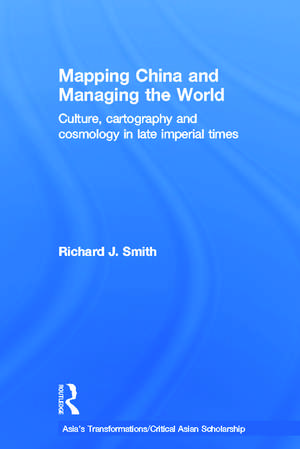Mapping China and Managing the World: Culture, Cartography and Cosmology in Late Imperial Times: Asia's Transformations/Critical Asian Scholarship
Autor Richard J. Smithen Limba Engleză Hardback – 19 oct 2012
The book begins with discussions of how the ancient work known as the Yijing (Classic of Changes) and maps of "the world" became two prominent means by which the Chinese in imperial times (221 BCE to 1912) managed space and time. Smith goes on to show how ritual (li) served as a powerful tool for overcoming disorder, structuring Chinese society, and maintaining dynastic legitimacy. He then develops the idea that just as the Chinese classics and histories ordered the past, and ritual ordered the present, so divination ordered the future. The book concludes by emphasizing the enduring relevance of the Yijing in Chinese intellectual and cultural life as well as its place in the history of Sino-foreign interactions.
This selection of essays by one of the foremost scholars of Chinese intellectual and cultural history will be welcomed by Chinese and East Asian historians, as well as those interested more broadly in the cultures of, and interactions between, China and East Asia.
Preț: 1168.09 lei
Preț vechi: 1424.50 lei
-18% Nou
Puncte Express: 1752
Preț estimativ în valută:
223.51€ • 233.99$ • 184.94£
223.51€ • 233.99$ • 184.94£
Carte tipărită la comandă
Livrare economică 05-19 aprilie
Preluare comenzi: 021 569.72.76
Specificații
ISBN-13: 9780415685092
ISBN-10: 0415685095
Pagini: 288
Ilustrații: 31 b/w images, 22 halftones and 9 line drawings
Dimensiuni: 156 x 234 x 18 mm
Greutate: 0.58 kg
Ediția:1
Editura: Taylor & Francis
Colecția Routledge
Seria Asia's Transformations/Critical Asian Scholarship
Locul publicării:Oxford, United Kingdom
ISBN-10: 0415685095
Pagini: 288
Ilustrații: 31 b/w images, 22 halftones and 9 line drawings
Dimensiuni: 156 x 234 x 18 mm
Greutate: 0.58 kg
Ediția:1
Editura: Taylor & Francis
Colecția Routledge
Seria Asia's Transformations/Critical Asian Scholarship
Locul publicării:Oxford, United Kingdom
Public țintă
Postgraduate and UndergraduateCuprins
1. Introduction 2. The Languages of the Yijing and the Representation of Reality 3. Mapping China’s World: Cultural Cartography in Late Imperial China 4. Ritual in Qing Culture 5. The Teachings of Ritual and the Rectification of Customs: Echos of Tradition in the Political Culture of Modern China 6. Divination in Qing Culture 7. Jesuit Interpretations of the Yijing in Global Perspective
Recenzii
"Mapping China and Managing the World should prove a useful work for those who study China’s cultural and social history as well as the global history of cultural exchange. [...] Smith’s additions to his previous work and responses to other scholarship make Mapping China and Managing the World valuable both for those not already familiar with his previous scholarship and for those who are particularly interested in it. Additionally, instructors would do well to consult this work when preparing lectures on Chinese cosmology and when considering readings to assign to students, given the accessibility of the book and the number of useful illustrations in the chapters on the Yijing and Chinese cartography." - Daniel Knorr, University of Chicago, Journal of International and Global Studies
Descriere
This book brings together a selection of essays by Richard J. Smith, one of the foremost scholars of Chinese intellectual and cultural history. Mapping China and Managing the World focuses on Chinese constructions of order and examines the most important ways in which elites in late imperial China sought to order their vast and variegated world, and will be welcomed by Chinese and East Asian historians, as well as those interested more broadly in the culture of China and East Asia.









